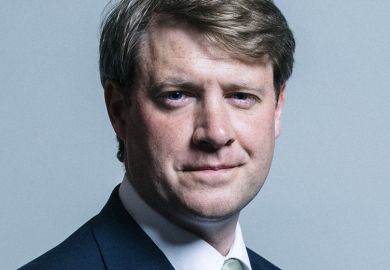An internal government tussle over potential further delays to the publication of England’s review of post-18 education centres on whether it will be a Treasury-dominated exercise aligned to the spending review, or one where the sector gets a chance to respond.
The Treasury has long wanted to delay publication of the report from the government review’s panel, led by Philip Augar, so it can be considered as “part of” the spending review, it is said.
Leaks have suggested that the panel will recommend a cut in tuition fees, meaning that the Treasury has crucial decisions to make about the extent and nature of replacement direct public funding. Some vice-chancellors have warned that there can be no expectation that the Treasury will fully replace lost funding.
The chancellor, Philip Hammond, has committed to holding a spending review this year, which could set departmental budgets between 2020 and 2023 (although the government is yet to clarify the period that it will cover). Some in government think the spending review may not conclude until the autumn.
However, No 10 and the Department for Education are thought to favour publication of the panel report in April or May. Chris Skidmore, the universities and science minister, recently told Times Higher Education that he wanted the government response to the review to “allow for the possibility of consultation”, which could mean a Green or White Paper.
That timetable could give the sector more opportunity to make a public case for replacement funding, or hope that any major changes recommended by the panel will end up in the long grass.
Although the panel is said to be reaching the latter stages in drafting the report, there may not be an appetite in government to take on another major issue before the scheduled date for the UK to leave the European Union – 29 March.
There is a perception among vice-chancellors that the Treasury has a hostile agenda towards universities, particularly in light of concerns about graduate earnings figures in some disciplines and institutions, and about the perceived generosity of the funding settlement reached in 2010.
Nick Hillman, director of the Higher Education Policy Institute, said that it was “important that there is sufficient time for the sector to have a full-blown conversation about the proposals before the spending review, as that’s when all the really big decisions for the next few years will get made.
“The process will be suboptimal if decisions are imposed on the sector at the spending review without a decent two-way conversation first. That’s in no one’s interests.”
Andy Westwood, professor of government practice at the University of Manchester, said that the “critical point” was that the post-18 review has “always been linked to the spending review”.
“Any requests for additional spending – whether that be for restoring grants, extending more support to part-time or to more students in further education, or bringing back teaching grants to offset fee cuts – have significant implications for spending and for the overall DfE budget in the coming spending review period,” he said.
Professor Westwood noted that the chancellor’s spring statement was scheduled for 13 March, suggesting that the review panel’s report “may well surface around that time”, when the Brexit picture “should be a little clearer”, given – in theory – “we will know whether we are leaving on 29 March and whether it’s with a deal or not”.
But he added that the Treasury will “want to control as much of this as they possibly can – from spending commitments to timing and presentation”.
Register to continue
Why register?
- Registration is free and only takes a moment
- Once registered, you can read 3 articles a month
- Sign up for our newsletter
Subscribe
Or subscribe for unlimited access to:
- Unlimited access to news, views, insights & reviews
- Digital editions
- Digital access to THE’s university and college rankings analysis
Already registered or a current subscriber?








